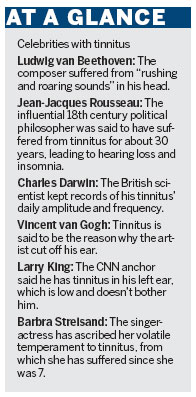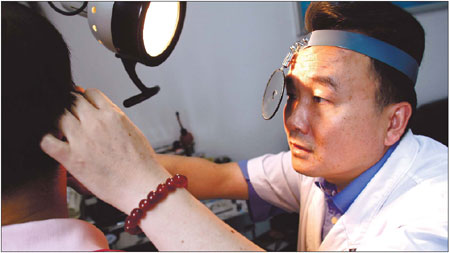Health
It's all in the head
Updated: 2011-06-29 07:52
By Liu Zhihua (China Daily)
|
Tinnitus is an indicator of complex health problems and may be caused by a wide range of disorders. Zhang Wei / China Daily |

Tinnitus is a relatively common and occasionally devastating health problem that can be dealt with if medical treatment is sought. Liu Zhihua reports.
One day in early 2008, Xiao Jun unexpectedly heard a buzzing sound mixed in with the background noise, as if there was a bee in his right ear. The young man didn't pay much attention at first, thinking it was merely a temporary irritation.
To his dismay, the noise followed him around for the rest of the day.
"Just imagine a bee in your ear that never stops buzzing. It was very unsettling," recalls the 30-something Xiao, who works at an airport.
He went to the hospital the next day. After taking some tests, he was told his right ear was losing sensitivity to high frequency sounds. This hearing impairment was attributed to exposure to loud noise at work.
Tinnitus - noise in one or both ears, or in the head - is actually common worldwide.
Somewhere between 12 and 32 percent of the general public experience tinnitus, according to the International Tinnitus Seminar 2011 recently held in Beijing.
"More than 70 percent of hearing impaired individuals have tinnitus, 80 percent of tinnitus patients have some evidence of hearing loss, and many people who don't have auditory problems also experience tinnitus," Robert Wayne Sweetow, a professor of otolaryngology with University of California, San Francisco, said at the Beijing seminar.
Tinnitus is not a disease - it's a symptom of an underlying condition, says Xia Yin, vice director of the department of ear, nose and throat infections at Beijing Tongren Hospital.
"But only about 10 to 25 percent of them (tinnitus patients) seek medical attention."
The forms of tinnitus vary from person to person. Noises such as hissing, humming, tinging, whistling, ticking, clicking, roaring, or even drumming, have been reported.
Doctors rate the condition clinically on a simple scale that goes from "slight" to "severe", according to its seriousness and how much it affects the patient's daily life.
Among the problems associated with tinnitus, one of the most severe is insomnia.
Xia, with Beijing Tongren Hospital, says one of his patients tried to commit suicide because of the unbearable sleeplessness caused by tinnitus.
For most sufferers, although initially the phantom sounds are relatively loud and annoyingly intrusive, over the next six to 12 months, they will tend to become softer and more familiar.
In the end, many sufferers simply ignore the ringing in the ear, which is dangerous because it is a health risk alarm, Xia says.
Hao Ruihong, a 65-year-old from Henan province, has been living with tinnitus for about three decades. She experienced a sudden headache when she was 37 and has heard sounds in both ears since then.
Unable to afford Western medication, she took some traditional Chinese medicines and underwent massage therapy, which did not work.
"I gradually got used to the tinnitus and stopped the treatments," Hao says.
At first, the tinnitus sounded like someone was rhythmically striking a piece of iron, then it sounded like a cricket, and now what she hears is like a pulse.
"Now I won't notice its existence until the environment becomes quiet," Hao says.
As a result, Hao learned to pay no attention to the condition. However, recently she found that she was having difficulty hearing normal sounds.
An examination suggests she has lost sensitivity to high frequency sounds in both ears, and her left ear additionally has difficulty hearing daily sounds.
"She should have come to the hospital earlier," says Xia, Hao's doctor.
Tinnitus is an indicator of problems in the outer ear, middle ear, inner ear, along the auditory pathway, and even certain areas that are not related to the auditory system, or systemic diseases, such as diabetes.
"The efficacy of treatments is determined by the many causes of tinnitus," Xia says.
Therefore, the first step is to identify what caused the condition and this can be imprecise as it is usually done by excluding certain diseases rather being directly diagnosed, Xia says.
Patients will be given a series of examinations, including hearing tests and imaging examinations. Doctors will also try to determine the frequency and loudness of the phantom sound according to the patient's description and a selection of sample sounds.
Tumors in the auditory system, and damage to the microscopic endings of the auditory nerves in the inner ear are the most common causes of tinnitus.
Foreign objects in the ear, and even earwax, can also be a cause.
In many cases, tinnitus is accompanied by neural deafness, Xia adds.

Once the causes are identified, a reasonable therapy can be determined.
For tumors, surgery is a possible solution, and for neural deafness related tinnitus, the remedy lies in the repair of the auditory nerves through medicines and injections that nurture and repair the nerves, and dilate the blood vessels.
"The nerves serve like electric wires, when the wires are old or damaged, undesired buzzing will occur. Similarly, when the wires are refreshed, the buzzing will disappear," Xia says.
If the underlying causes cannot be identified, then it is likely there will be no cure, Xia says.
In such cases, patients need to be prepared to live with tinnitus. If the tinnitus is too annoying to ignore, patients may use devices that generate white noise to habituate themselves.
But it is important that people with tinnitus have health checks, in case the condition further develops.
Since his tinnitus diagnosis three years ago, Xiao Jun has taken medication to repair ear blood vessel and nerve damage.
Now his hearing loss is controlled and the phantom noise in his ear has decreased to a tolerable ringing sound, giving Xiao relief.

Specials

90th anniversary of the CPC
The Party has been leading the country and people to prosperity.

Premier Wen's European Visit
Premier Wen visits Hungary, Britain and Germany June 24-28.

My China story
Foreign readers are invited to share your China stories.
